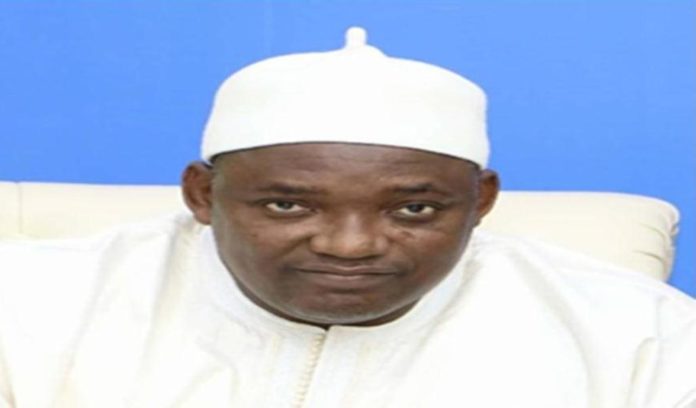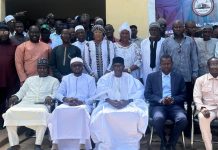It is both a pleasure and honour for me to be invited by Chatham House, an internationally renowned institution, to speak on the topic “Shaping The Gambia’s future: how to build a path to sustainable progress”.
Mr. Chairman, the socio-economic and political context of The Gambia has been characterised by over two decades of dictatorship. The country lost its friends and status in the community of nations and respect as home of human rights in Africa.
The peace and stability it nurtured since it attained independence in 1965 eroded in the 22 years of dictatorship. This affected the economy, and disintegrated the social fabric of the society. Many of the youth left in search of a better life; in most cases through dangerous means, to reach Europe and other parts of the world. The political environment was dangerous for freedom of expression and respect for human rights. Thus, a serious brain drain followed.
The business environment was risky, because the rule of law was not respected. The institutions have been destroyed, systems and procedures were not respected; thus instilling care-free attitude in the public service.
Mr. Chairman,
This unfortunate scenario forced Gambians to take a decision to define their destiny. In 2016, eight stakeholders in the political arena came together to form a coalition and, on the 1st December 2016 Presidential election, Gambians went to the polls and voted me as President.
Immediately after the Coalition government came to office our first priority was to re-open The Gambia to the world, promote human rights and restore freedom of expression. We had to build confidence amongst our partners and prepare a strategy to put The Gambia on the path of sustainable development. In short, we had to right the wrongs in our institutions, systems and procedures. We had to engage in institutional and legal reforms to ensure efficiency in the public service, good governance and progress in national development. My Government’s strategy is now clearly outlined in the National Development Plan 2018-2021.
One of the first steps undertaken was to establish the rule of law by releasing all political prisoners, set up a review panel on wrongful dismissals and de-congest the Office of the President. All the portfolios were decentralised to their line ministries. This was to allow the experts and technicians to deal with issues in a professional manner and provide technical advice to the Office of the President.
In the meantime, my Government continues to build on its diplomacy to return The Gambia into its rightful place in the community of nations and organisations. One of these is the Commonwealth and we are delighted by the re-admission of The Gambia into the Commonwealth of Nations.
Building the path of sustainable progress in The Gambia cannot be isolated from the global trend of events. It calls for working towards a “Common future”, the theme for this year’s Commonwealth meeting. The spirit of togetherness is key for effective change.
This has been demonstrated when Gambians came together to change a dictatorship, which for two decades, rubbed the country’s resources. My Government inherited just over one month of import cover, thus its dependence on international support to revitalise its economy. Therefore, developed countries should provide improved access to their markets; introduce and promote measures to liberalise trade, particularly in processed agricultural and manufactured goods.
The reality of climate change has subjected our people to abject poverty and driven our youth to illegal migration. To address this unfortunate situation, youth employment is a key priority of my Government. Particularly important is their participation in socio-economic activities, training and entrepreneurship.
My Government is working to introduce and implement action-oriented measures designed to fight poverty. These measures include effective promotion trade and investment, given their importance and potential in generating employment for the youth and economic growth. Modernised agri-business, processing and packaging of products for the export market will all open The Gambia to regional and global markets. It has the land, water and human resource to curb hunger and ensure food security.
When we came to office, we instantly faced formidable challenges because of domestic and foreign debt and widespread economic mismanagement. Therefore, my government has embarked on the effective implementation of macroeconomic policies that are supportive of the sustainable development goals.
Priority will be given to decentralise economic activities throughout the country. The rational use and allocation of resources have so far been employed without sacrificing the quality and standards of services. Conscious efforts have also been made to strengthen and improve institutional, technical and managerial capabilities of public sector agencies, and the institutional framework for macroeconomic planning and development is fully operational. Sector programmes and projects have been aligned to the National Development Plan 2018 – 2021.
Special focus is also being given to improving the economic and social status of women. Policy decisions and projects are designed to promote gender equality and women’s economic empowerment.
Efforts are being made towards diversifying The Gambia’s economy, through agriculture, tourism and fisheries.
This requires knowledge transfer and skills development for the youth and to improve the livelihood of rural families. All these are meant to put Gambia on a sure path to sustainable progress.
As part of the effort to promote trade and enhance private sector initiatives designed to increase employment and promote the diversification of the Gambian economy, special focus is put on accelerating the growth of Small and Medium Enterprises. The enabling environment has been created to attract both domestic and foreign direct investment.
The initiatives include the improvement of the institutional credit support system for small and medium enterprises, as well as improving the regulatory environment for business.
Mr. Chairman, my government’s strategy on education focuses on providing quality of basic education, improving the qualification and quality of teachers, strengthening science and technology in higher education and developing coherent and sustainable systems for technological skills acquisition and development.
Also, improving women’s level of education and literacy is part of gender responsive development. Where necessary new schools will be built and existing ones upgraded.
Given the importance of ensuring quality health services, due emphasis is put on establishing an integrated primary health care system, reducing mortality rates, ascertaining food security and the provision of safe drinking water. Other activities promote reproductive health rights and environmental sanitation. My government will also improve the efficiency of hospitals and other health facilities.
Mr. Chairman, to be successful in all our endeavours, The Gambia would certainly need the continued good will and special assistance of developed countries. In the same vein, I recommend that the International Financial Institutions recognise the special circumstances of The Gambia and significantly increase the amount of concessionary loans provided to the country.
Mr. Chairman, now that The Gambia has been re-admitted into the Commonwealth of Nations, we can look forward to a strong diversified support from the Commonwealth.
Mr. Chairman,
The Gambia cannot build the right path to sustainable progress without ensuring that there is peace, stability and justice. In this regard, my Government has embarked on transitional justice for legal and constitutional reforms to entrench human rights, peace, justice, freedom of expression and the rule of law.
The political will is to ensure that democracy thrives and citizens effectively take ownership of the development process.
In conclusion, the NEW GAMBIA is determined to overcome obstacles along the way in building a path for sustainable progress. As President, I feel humbled the delivering of good governance and accountability, social cohesion, and a revitalised economy for the wellbeing of all Gambians, as stated in our National Development Plan 2018-2021.
I thank you all for your kind attention.



















